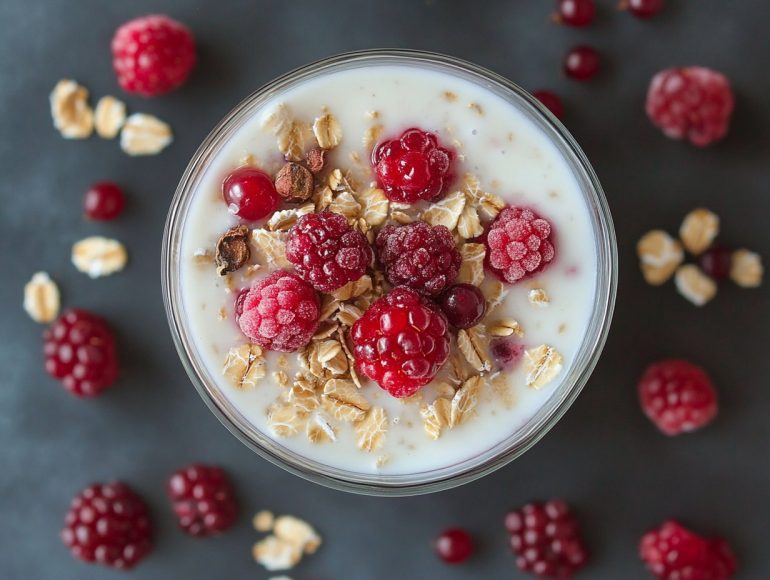The Best Breakfast Foods for Weight Loss, According to a Dietitian
Need ideas for a healthy breakfast? Mix up your morning meal and try one—or a few—of these five healthy breakfast foods that help you lose weight.
Starting your day with healthy breakfast foods can help you maintain energy, keep hunger at bay and lose weight. You’ll find differing opinions on the role of breakfast on your weight, but one study suggests that regular breakfast eaters tend to be more successful at losing weight. And a review of studies indicated that breakfast eaters have a reduced risk of developing obesity, heart disease and metabolic syndrome. Whatever the case, people who eat breakfast typically get more of certain important nutrients, like vitamins, minerals and fiber, which play a role in weight control.
A healthy and balanced breakfast should deliver a mix of protein, complex carbohydrates, fiber and healthy fat to keep you full and fueled up for your day. Read on to find out some of the best healthy foods to eat for breakfast to help you lose weight and why they are so good for you.
1. Raspberries
A cup of raspberries delivers a whopping 8 grams of fiber, which is more than double what’s in a cup of strawberries and about the same amount in a half cup of black beans. What’s so great about all that fiber? Research suggests that increasing the fiber in your diet from fruits, vegetables, whole grains, nuts and beans is associated with increased weight loss over time.
2. Oatmeal
Does oatmeal help you lose weight? It certainly can! It’s packed with fiber, and it keeps you feeling fuller longer. Eating “slow-release” carbohydrates in foods such as oatmeal won’t spike blood sugar as high as eating refined carbohydrates (think: white toast). In turn, insulin levels don’t spike as high. Insulin plays a role in signaling your body to store fat; having lower blood sugar levels may help you burn fat.
3. Yogurt
Yogurt has been extensively studied for its role in weight management. One study found that yogurt, but not other forms of dairy, was associated with less weight gain and lower risk of obesity in perimenopausal women. Protein, including whey protein found naturally in yogurt and other dairy products, is filling and takes longer to digest than simple carbohydrates. You can decrease the amount of calories and added sugar you consume by choosing plain yogurt and adding fresh fruit for sweetness.
4. Peanut Butter
Nuts are also packed with protein and fiber to help you stay full for longer and promote weight loss. That’s probably because peanut butter and all nuts and nut butters deliver a good dose of healthy fats, fiber and protein—all satisfying nutrients. While nuts and nut butters are calorie-dense, 2 tablespoons of peanut butter has just under 200 calories, 8 g of protein and 2.5 g of fiber. It’s also nutrient-dense and helps you build a satisfying breakfast.
Try spreading a tablespoon or two of peanut butter onto whole-wheat toast (which has “slow-release” carbohydrates) or adding nuts or nut butter to your oatmeal (also a “slow-release” carb) for a balanced meal.
5. Eggs
One large egg has 6 g of protein and 72 calories. Compared to carbohydrates and fat, protein keeps you satisfied longer. One study found that having eggs for breakfast improved eating satisfaction and decreased calorie consumption at the next meal. Eggs are incredibly satisfying and can help keep hunger at bay when combined with whole grains and fruit or vegetables.
And while just eating egg whites will help you save calories, you’ll also lose half the protein (about 3 g is in the yolk), which helps make eggs a powerhouse choice for breakfast. Plus, the yolk is rich in healthy nutrients, like calcium and eye-protecting antioxidants (lutein and zeaxanthin).
Yolks are a significant source of dietary cholesterol. But more recent science suggests that dietary cholesterol isn’t inherently bad for heart health and researchers think that eating one whole egg every day is fine for most people.
The Bottom Line
Starting your day with a balanced breakfast can set the stage for success in both weight management and overall well-being. Foods like raspberries, oatmeal, yogurt, peanut butter and eggs offer a wealth of nutrients, including fiber, protein and healthy fats, to keep you feeling full and energized. These options help with managing weight, support heart health and reduce the risk of conditions like obesity and metabolic syndrome. By prioritizing nutrient-dense, whole foods in your morning routine, you can fuel your body effectively and establish healthy habits for the rest of your day.

